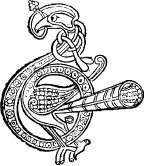
Jurors in Ancient Irish Law

EFORE passing quite away from the legal system, a class of men, though not professional, connected with an important branch of the law may be noticed. They were drawn from the lay community in each cinel or tuath, and to twelve of them, as to a sort of jury, certain matters in dispute requiring knowledge other than legal were submitted, as, for instance, the manner in which land should be newly apportioned under the Irish system of gavelkind. The law determined the proportions, provided the quality of the land was uniform and other circumstances equal. As this would rarely happen in practice, these twelve men determined the actual proportions. They also arranged in the early part of each year how the common lands of each sept should be used that year. What the relations of those men to the clan were, what the qualification for the office, how the office descended, &c, are left open questions; and this is perhaps the best thing to do in the present neglected condition of the Brehon Laws. Still I should not be surprised if it were found on inquiry that it was not an office at all, but a power inherent in a certain status, and that every flaith-fine, or paterfamilias, was entitled to exercise it unless he had in some way forfeited his title.

